Van life: how to live in a van and save money
The cost of rent is the biggest expenditure for students. But, we chatted to a savvy student who decided to live in a van as part of his mission to graduate without any debt.

Uni life is expensive. As well as tuition fees, you have to contend with Maintenance Loans that fall well short of living costs.
Rent is by far the biggest expense for a student, even with our tips for saving on rent. But there are some more extreme ways of saving money on accommodation.
After graduating from the University of Buffalo with what he deems a "monetarily useless liberal arts degree", Ken Ilgunas moved to the aptly named Coldfoot in Alaska. It was here that he set about paying off his $32,000 student debt.
Two and a half years, plenty of poorly-paid jobs and several thousand miles of hitchhiking later, he managed to repay his entire student debt. But that's not where Ken's money-saving mission ends – it's where it begins.
How Ken got a postgraduate degree without debt
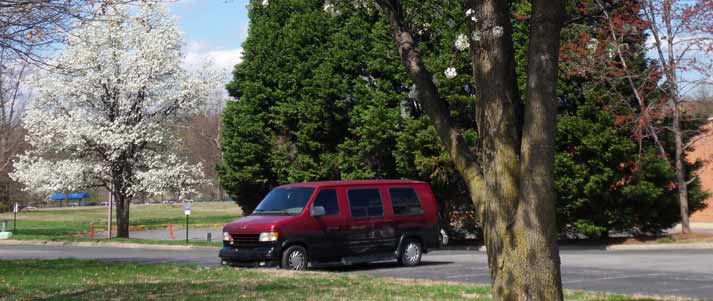
While working to pay off his undergraduate loan, Ken says he realised two things. First, he wanted to get a postgraduate degree. Second, he never wanted to be in debt again. So when his application to Duke University, North Carolina, was accepted, Ken had to get creative with his finances.
From his two and a half years of work, he had about $4,000 left over. After racking his brains for a way to make it through a two-year degree debt-free, Ken had a brainwave – why not live in a van?
Ken went straight to Craigslist (similar to Gumtree). He searched within a budget of $2,000 and just two requirements (the van had to be in reasonably good nick and have never been smoked in). He soon found his van.
For the modest sum of $1,500 (about £1,184), Ken became the proud owner of a 1994 Ford Econoline (nope, we'd never heard of it either).
With his accommodation sorted, Ken had to tackle paying for his postgraduate tuition fees and living costs. As he was dead against taking on any debt, a Student Loan was out of the question.
The total cost of tuition for his two-year master's degree was originally $30,000. But thanks to financial aid (student bursaries), Ken managed to get it down to $11,000. That was two-thirds of the job done, straight off the bat!
But his living costs and the remaining tuition fees still needed paying. So, Ken decided to take up a series of different jobs to keep his bank balance above water.

I funded my living costs in a few ways: occasional medical experiments, a part-time job tutoring elementary school students and a summer job working for National Park Service in Alaska.
All of these are viable (and interesting!) options for students in the UK. We have guides on making money from clinical trials, becoming a tutor and a part-time job search.
How much does it cost to live in a van?
When explaining the costs of van life, Ken is keen to stress that, unlike paying for rented accommodation, the money spent on a van doesn't just disappear. Unless it breaks, that is.
Keep in mind that a vehicle maintains some value, so you can expect a lot of that money back if you sell it.
However, while I only lived in the van for two years, it did end up crapping out on me on a drive across Iowa, only getting me $300 for scrap metal.
According to Ken, staying in uni halls or private accommodation would have cost at least $500 a month. To put it another way, he got two years of accommodation for the price of three months. In fact, it's even less if you include the money he made from selling the van.
But when you're staying in halls, you're not simply paying for the roof over your head.
What about mail, showers, or obtaining cooking water? These, again, are all cheap or free.
True to form, Ken managed to source pretty much everything he'd need for a 'normal' existence for a fraction of the 'normal' price.
Using a couple of sizeable containers, Ken used the campus' fountains to save money on water.
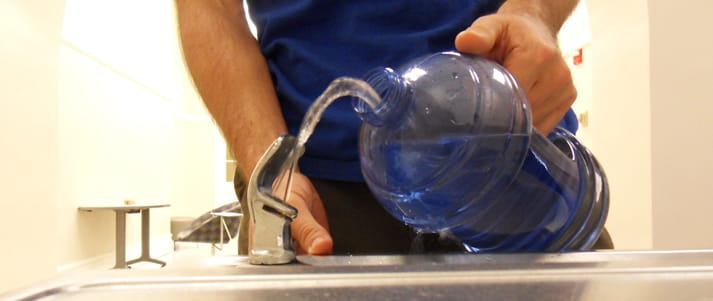
To keep clean, he bought a campus gym membership for just $68 a year. This gave him access to toilets, showers and, of course, gym equipment.
As for meals, Ken only needed to spend $30 to get his hands on a year's worth of iso-butane cooking fuel. This meant he could prepare his meals from scratch, rather than relying on takeaways or eating out at restaurants.
Cooking your own food will save you tons of money, too.
The average college meal plan can cost as much as $10,000 (£7,892) for an academic year. I ate for $4.34 (£3.40) a day, or $1,100 (£868) for an academic year.
Even after accounting for his car insurance ($46, or £36, a month), mobile phone contract ($37, or £29, a month) and parking permit ($182, or £148, a year), Ken still reckons that conventional accommodation would have cost several thousands of dollars more – as this table shows:
| Accommodation type | Rent per month | Food per month | Car costs per month | Other costs per month | Total per month |
|---|---|---|---|---|---|
| Halls | £483 | £400 | £0 | £54 | £937 (£11,244 a year) |
| Student house | £415 | £117 | £0 | £54 | £586 (£7,032 a year) |
| Van | £0 | £117 | £166 | £54 | £337 (£4,044 a year |
NOTE: All figures are minimum estimates, provided by Ken Ilgunas. We converted them into GBP. Conversions were accurate at the time of updating. It's also worth noting that this article was originally published in 2018. Due to inflation, the figures mentioned would be higher today.
What is it like to live in a van?
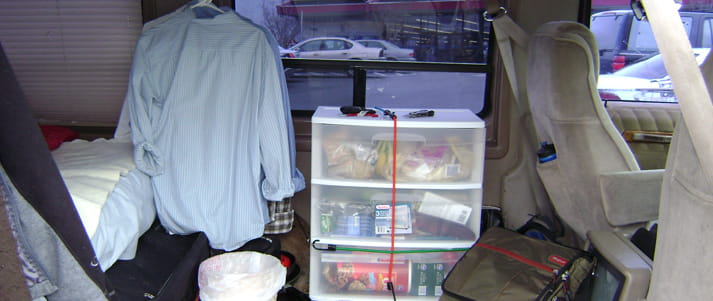
It's all well and good as a money-saving exercise, but what use is van life if the cost to your wellbeing outweighs the financial gains?
When we asked Ken what he missed most about 'normal' living, his answer caught us by surprise.
I must say I missed very little.
I had an unbelievable university library that gave me access to an amazing selection of books and movies. The campus gym had hot showers, a basketball court and even a sauna.
I ate fresh food every day to and from my walk to the grocery store.
That said, Ken readily admits that van life isn't without some compromises.
It was lonely, but I don’t want to blame that entirely on the van. I’m a bit of a loner, and moving to a new place, regardless of your style of home, often comes with a period of social isolation.

And, as you'll know, when the weather is cold, cars are cold. And when the weather is hot, cars are hot.
Duke University is situated in North Carolina, which is about as far south as the northern tip of Africa. Temperatures regularly exceed 30°C in the height of summer and, as Ken explains, he had to move north for a few months to make life bearable.
I worked in Alaska during the summer months, so I didn't have to live in the van in North Carolina. It would have been just too hot.
The months of May and September were bad enough. I basically couldn’t go into the van during the day, or I would have experienced heat stroke.

Despite the baking summers, North Carolina is no stranger to some biting winter weather. Fortunately for Ken, he was prepared for that too.
It got down to about -12°C during the winter, but I had a really good sleeping bag. I never had an uncomfortable night.
Top tips for living in a van
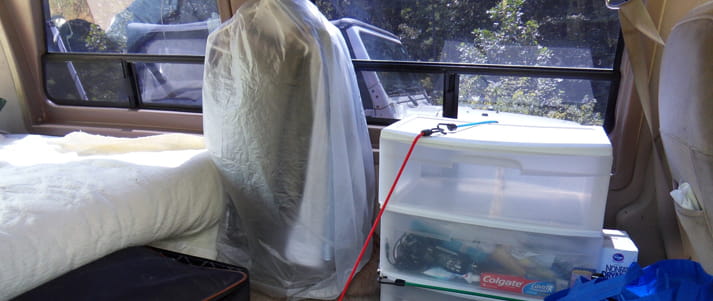
Having endured two years of van life, Ken is better placed than most to give pointers to anyone considering making the leap themselves.
His main tip is to check that you're actually allowed to live in a van on campus before stumping up the money to buy one.
Check out your university’s parking policy online. Find out whether or not vandwelling is illegal, or at least whether it’s okay to park your vehicle there overnight.
If that doesn't work out, you can park on other roads, in supermarket car parks, or you might even find someone online who'll let you rent a space.
We're not aware of the hard facts on this one, but as the US is a lot bigger than the UK, we're imagining that campus parking spaces are at more of a premium over here. So, any British student looking to live in a van might have to look beyond university for somewhere to pitch up. You don't want to be appealing parking tickets throughout your years at uni.
Once you've established whether or not van life is a realistic option, Ken says the rest is up to you!
Bring some basic camping equipment along: a sleeping bag, headlamp, thermal underwear, cooking supplies, and so on.
Other than that, I suppose the most important thing is to be flexible and creative.
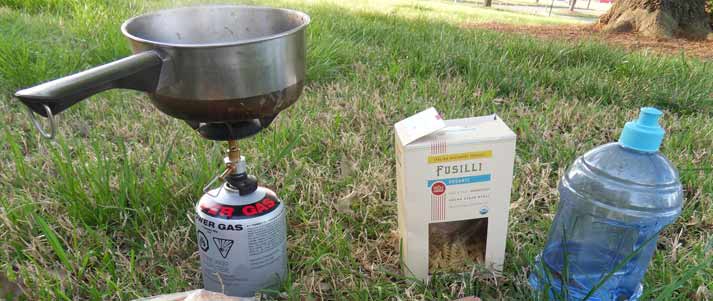
Of course, it takes a special kind of person to have the commitment and drive (no pun intended) to live in a van. And, for Ken, the financial gains ended up being a by-product of what he really gained from the experience.
The van was much more than a cost-saving decision. It was an experiment. It was an adventure.
I wanted to spend a portion of my life living deliberately. I wanted to push myself to the limits to learn something about myself, my culture, humanity… I hoped I might learn something that would guide me to live a good life. Saving money was just the cherry on top.
Ken's money-saving advice

Ken is definitely up there as one of the most dedicated money-savers we've come across.
For that reason, our final question to him was simple. "Other than van life, what is your number one money-saving tip?"
As Ken was so dependent on a van for so long, his answer certainly wasn't what we were expecting.
Unless you’re living in it, get rid of your vehicle.
Wait, what?
I paid off a $32,000 student debt in two and a half years (working mostly low wage jobs) largely because I didn’t have a vehicle.
Without having to pay for fuel, insurance, or maintenance, I was able to direct almost all of my earnings to my debt.
Sure, a vehicle is necessary to function in a lot of places. But there are places where you don’t need one, and you’d be surprised at how resourceful you can be when you cut yourself off from something you thought you depended on.
It's worth remembering that Ken is speaking from his experience as a student in America. We'd argue that in the UK, there are very few (if any) unis where it's necessary to have a car. Most are based in, or close to, major towns and cities. They usually have decent transport links too.
That said, if you absolutely must have a car at uni, make sure you check out our guide to cutting the cost of driving.
Keen to find out more about Ken's fascinating story of van life? Grab a copy of his brilliant book Walden on Wheels, and check out his interview on The Tonight Show with Jay Leno.
More unusual types of university accommodation

Source: Reddit
Ken is far from the first student to take an unorthodox approach to saving money on rent at uni.
We've previously covered the story of Joe Pearce, a student who bought a boat to save on rent. 'The Golden Cloud' cost him just £800, plus an extra £1 a day to keep it in the harbour.
If your uni isn't near a body of water, this may not be the most useful tip for you. But if it is a viable option, bear in mind that living on a boat saved Joe around £5,600!
And then there's Evan, a Canadian student studying at the University of Manchester. He made the headline-friendly decision to live in a tent to save on rent.
In exchange for cooking and washing up, Evan bagged himself a spot in someone's back garden. Here, he pitched (and lived in) a tent for an entire year.
So, clearly, there are plenty of ways to cut the cost of living at uni. It's just a case of putting your mind to it!
Discover how one student is saving money and the environment by ONLY buying clothes second-hand.








